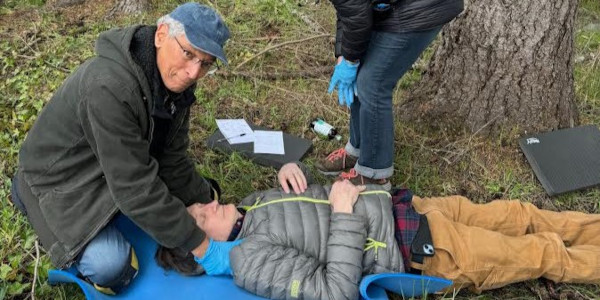I’m a Woofer!
I’m a Woofer! Two years ago I took an intensive 5-day course to become a Wilderness First Responder (WFR), or “Woofer” as we affectionately call each other. We Woofers are trained to deal with injuries and illnesses in a “low resource environment,” such as a backpacking trip in the boonies, where proper medical care is a long way away. We learned what to do about fractures, heatstroke, third degree burns, dislocations, near drowning, spinal cord injuries, massive bleeds, and allergic reactions. Not to mention back country heart attacks, spider bites, and anaphylaxis.
In addition to classroom learning, the course included lots of simulations, culminating in a late-night final exam. In the exam we dealt with an MCI (mass casualty incident, just in case you didn’t know), in the deep woods of Fort Ward on Bainbridge Island. Turns out that a group of campers were peacefully sleeping in their tents at the base of a cliff when, in the middle of the night, there was a major rockslide. We Woofers-in-training were rushed to the scene. In the dark we had to locate the victims, who, despite their grave injuries, had somehow been able to leave their tents and scatter throughout the woods. Once we found them–their wounds highlighted by the fake blood that glistened in the light of our headlamps–we had to diagnose and treat the grisly injuries they had sustained. Fortunately, the patient with a spinal cord injury that I ministered to survived, and I passed the course.
Then just a few weeks ago I took a three-day refresher course to maintain my Woofer credentials. (Technically, I’m actually a “Wumper”—WUMP stands for “Wilderness Update for Medical Professionals”—but it comes down to the same thing.) This time the MCI was a serious earthquake. My poor victim was a 91-year-old woman (both in the script and in real life) who, while trying to escape a collapsing building, was impaled in her right chest by a three-foot length of rebar. She heroically, but unwisely, yanked out the rebar. Thus, when I found her, she was experiencing severe bleeding, shortness of breath, and a nasty sucking chest wound. Once again, I was fortunate to be able to stabilize her (and, along the way, confirm that her real pacemaker was still working properly), and passed the course. So I’ll continue to be a certified Woofer for the next two years.
Why, you might ask, did I decide to become a Woofer in the first place? No, I’m not planning to scale Mt Everest, or even do the Pacific Crest Trail. But I live well within rumbling distance of the Cascadia Fault. We’re told that a massive earthquake (Richter 9 or so) is overdue, and reasonably likely to occur sometime during the next fifty years. That is, The Big One could happen long after I’m gone. Or tomorrow. (Or, as in the simulation, a few weeks ago!) When it comes our island will be completely cut off from medical care—the ferries won’t be running, the bridge to the mainland will be in shambles, and there won’t be electricity, or even cell service. (That’s why a year ago I earned a ham license; now I have to get around to learning how to use my transceiver!)
So in anticipation of The Big One I joined the Bainbridge Island Medical Reserve Corps, and became a Woofer to boot. After the shaking stops, I’m to report to our local “disaster hub”, one of twelve on the island. My hub is at the Seabold Church, about 0.8 miles from our home. It should be an easy walk, assuming I’m able to hop over all the fissures in the earth en route. At the church, where there’s a big trailer stocked with all sorts of medical supplies and emergency gear, My fellow Woofers and I should be in a position to treat earthquake-related injuries as well as chronic health conditions.
But even if the hubs are activated in my lifetime, the things I’m likely to deal with compromise only a small part of the skills I was taught in Woofer Academy. What about all the other things I learned and was tested on? The chance of my ever needing to care for a scorpion sting is about on par with the chance of my having to treat someone struck by lightning. So I wonder: what was the point of spending so much time, energy, and money learning stuff I’m very unlikely to ever use?
Here’s my answer, or perhaps rationale, for becoming a Woofer: First of all, it’s quite possible that a disaster, natural or man-made will in fact occur when I’m in a position to help. As a physician I’d feel terrible if I had no relevant skills and just stood around helplessly while people were suffering. So even if most of my Woofer learnings won’t be called upon, and even if I recalled only some of the useful ones, I might be able to help someone who otherwise would receive no assistance. Second, there’s pleasure in learning new things, or relearning old ones, even if they aren’t of practical use. Third, ya never know! Though I doubt that I’ll ever find myself trekking across the desert and encountering someone with heatstroke or strolling atop a glacier and stumbling over a person with frostbitten toes, other situations may arise where what I’ve learned could help. In fact, just a few months ago there was an announcement on the ferry for any medical personnel on board to report to the second mate’s office. I did, and was led to the bottom of the staircase that went down to the car deck. A man had tripped and fallen, sustaining some nasty facial lacerations (this time the blood was real). I was able to help check him out and, when a crew member appeared with a medical kit, stabilize him until the boat docked in Seattle and the EMT crew came aboard and took over. It felt good to be able to give my sudden patient help and reassurance.
The Big One might not occur in my lifetime, and the hubs may never be activated. Thus, I may never be called on to apply a tourniquet to stop a radial artery bleed, or start an IV to treat serious dehydration, or splint a fractured tibia. But there’s still a great deal of satisfaction in knowing how to do these things, whether I’ll ever use them or not. I’m glad that I’m a Woofer




I’m glad you are, as well!
Ken, Reading your essay reminded me of the Boy Scout Motto: “Semper Paratus” ! And, it was nice to hear that you are enjoying the process. It’s much more fun to be involved than to watch the news, I think.
Good luck in your new WFT role! Sincerely, Carl
Way to go, Ken! I’m glad you’re a Woofer, too! Somehow this beats book clubs and choir practice—something I’m involved in after a 20 year hiatus! And you are right! Learning—or brushing up on—old and new skills is a wonderful thing!
I’m glad you’re a Woofer, too! It’s reassuring that you’re close by in case the Big One strikes. Now I just need a boat to get across the Agate Passage…
I just now read this (not sure how I missed it). Bravo for keeping your skills up to speed and being ready for disaster. I’m glad the people who live around you will be able to receive your help if The Big One hits (or other disasters strike). On the other hand, I truly hope no major disasters actually happen because it would mean being cut off from you guys – possibly for a very long time. There’s no bandage big enough to cover that wound.